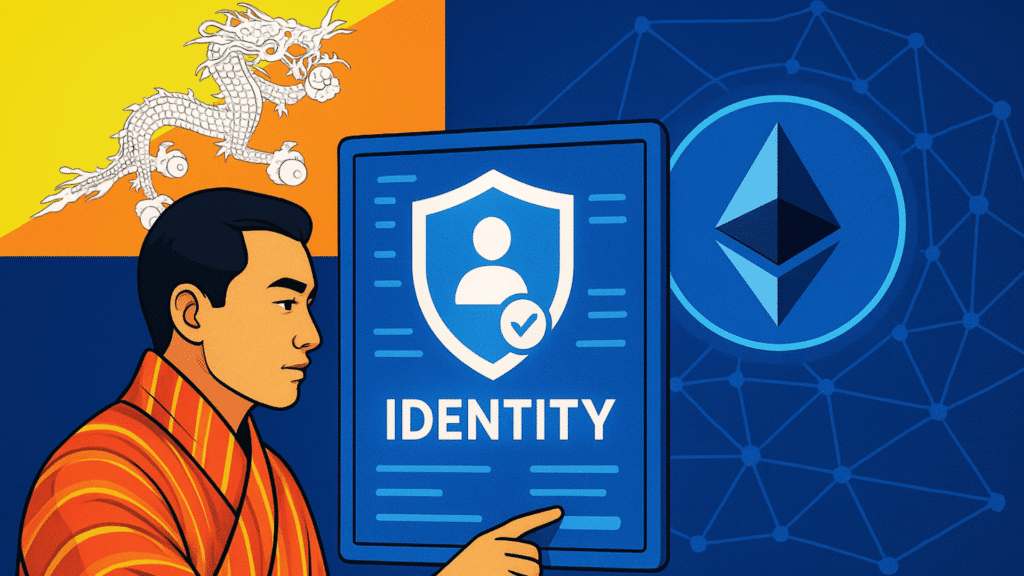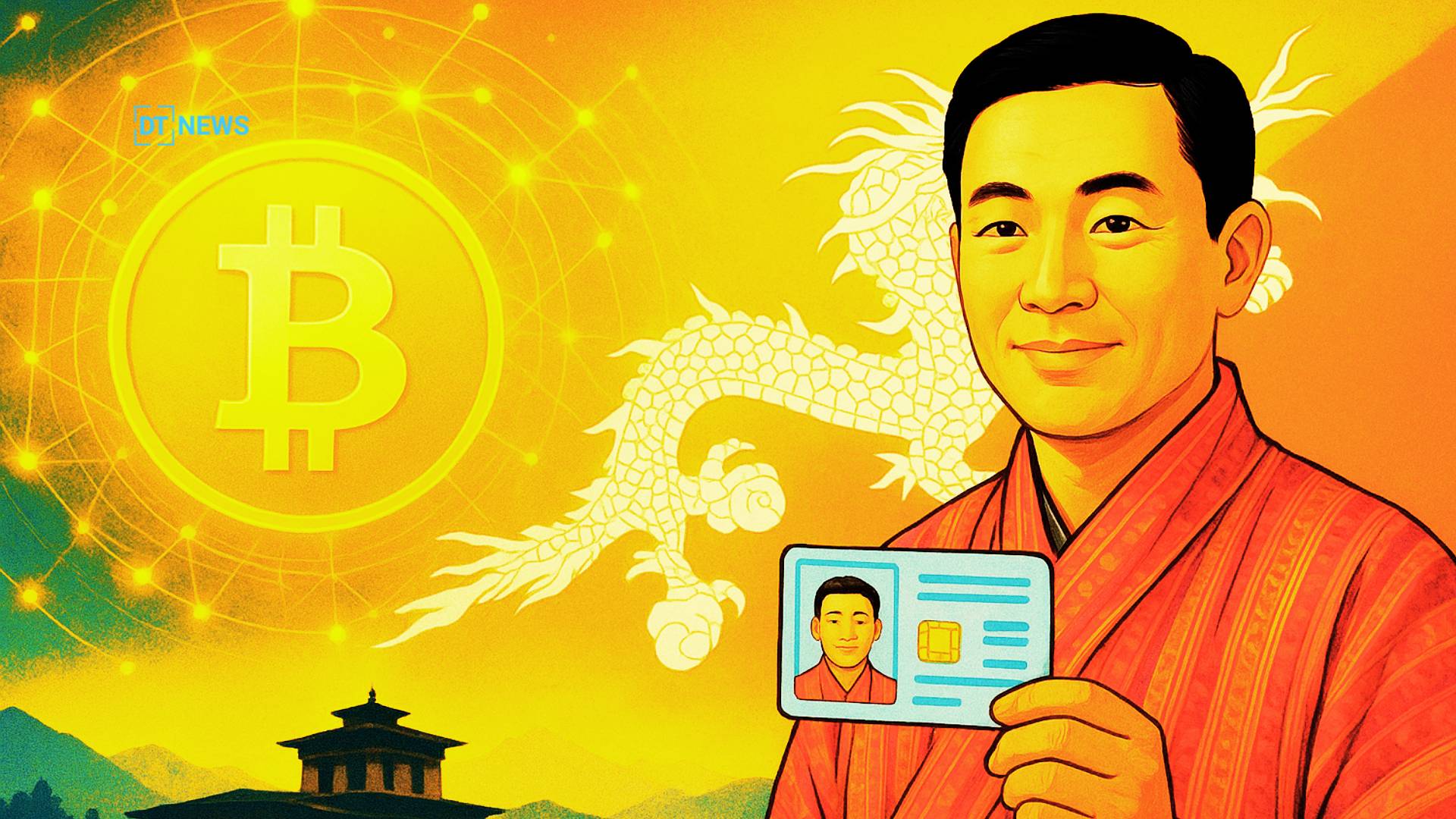According to the sources, Bhutan national digital identity has made a major step by moving to the Ethereum blockchain. The country is the first in the world to put its national digital ID on a public network.
This change marks a new stage for secure digital identities and modern public services. Experts say it sets an example for other countries in digital identity and national control.
Why Did Bhutan Move Its National Digital Identity to Ethereum?
Bhutan moved its system from Polygon to Ethereum to improve security, transparency, and control. The Bhutan national digital identity lets citizens safely verify their personal information using cryptography. This ensures that sensitive data is not shared or exposed.

It gives people more trust and control over their digital identity. Jigme Tenzing, Secretary of Bhutan’s GovTech Agency, said the move strengthens the security of the Bhutan national digital identity.
The change makes the system more reliable and trusted by the people. Ethereum’s public network allows checking and auditing that private networks cannot provide. Important data is kept safely off the blockchain while still being secure.
Also read: NFTs and Digital Identity: New Use Cases for Blockchain Technology
How Does the System Work?
The Bhutan national digital identity uses self-sovereign identity technology. Citizens can save their personal credentials safely. They are able to show proof of age, where they live, and their citizenship. The system uses Ethereum to keep this information secure.
This makes it easy and safe for everyone to verify their identity. The information is kept secure through cryptographic methods, and privacy is protected using special verification techniques. The Bhutan national digital identity is an important step in building secure digital systems.
Leaders from the Ethereum Foundation said this move supports a safer and more open digital future. The development has significance not only for Bhutan but for the wider world.
What Are the Economic Implications?
Bhutan holds a strong position in the world of cryptocurrency. The country owns about 6,371 BTC, which is worth around $725 million, putting it among the top government holders. It also has 656 ETH valued at about $2.73 million.
These holdings show Bhutan’s steady move toward a more digital future through the Bhutan national digital identity program. Bhutan’s move to work with Ethereum also helps its tourism industry grow. Travelers can use BTC, ETH, or BNB to pay for hotels, transport, and other local expenses.
The move helps connect blockchain use with real economic benefits. It also strengthens the role of the Bhutan national digital identity in the country’s digital progress.
Could There Be Risks in Public Blockchain Adoption?
Experts say that putting national IDs on a public network has both advantages and risks. Kirill Avery, the head of Alien, mentioned that transparency helps with checking and verifying information but can also reduce privacy.
If information on the blockchain is not handled with care, it could lead to unwanted tracking. Bhutan’s plan tries to keep a fair balance between proof and privacy. This careful approach may serve as an example for other countries looking to build similar systems.
Also read: Decentralized Identity: How Blockchain is Redefining Personal Data Security
What’s Next for Bhutan’s Digital Vision?
The complete move of the Bhutan national digital identity system is planned to finish by early 2026 under the Digital Drukyul program. The country also plans to grow its blockchain-based services and support new projects for developers.

These actions help Bhutan become more digitally independent. They also improve the country’s technology systems. Vitalik Buterin, cofounder of Ethereum, said Bhutan’s use of open source tools helps society. He added that other countries could follow Bhutan’s model for digital ID systems.
Conclusion
The move of the Bhutan national digital identity to Ethereum is a big step for digital governance. Citizens in Bhutan now have better control over their personal information. The move to Ethereum also increases the use of blockchain in everyday services. The focus on security and privacy makes Bhutan a leader in public digital systems.
Other countries may look at Bhutan’s approach and reconsider how they handle identity and government services. The project shows that blockchain can be used in official systems. Bhutan’s efforts reflect careful planning for the future. It also proves that decentralized technology can make a real difference.
Summary
Bhutan national digital identity is the first to use Ethereum. Citizens can safely verify age, residency, and citizenship. The system keeps information private and secure.
It also allows crypto payments and new digital services. Experts believe other countries might adopt similar systems. The full rollout is expected by early 2026 under the Digital Drukyul program.
Discover how countries like Bhutan are redefining digital trust and stay updated on our platform to see which nations follow next.
Glossary
Polygon: A blockchain used before Ethereum for Bhutan’s digital ID.
Verifiable Credentials: Safe digital proof of personal information.
Cryptographic Proofs: A way to prove information is true without showing private data.
Selective Disclosure: Sharing only the information you want to share.
SSI: A system where people control their own digital ID.
Frequently Asked Questions About Bhutan National Digital Identity
What is Bhutan National Digital Identity ?
It is a system that lets people check their personal information, like age or address, online.
Which blockchain is Bhutan using for its NDI?
Bhutan uses the Ethereum blockchain for its digital ID.
What did Bhutan use before Ethereum for its NDI?
Before Ethereum, Bhutan used Polygon and Hyperledger Indy for its digital ID system.
What benefits does Ethereum provide to Bhutan’s NDI?
Ethereum keeps people’s information safe and secure without relying on central databases.
How does this move help citizens?
It gives people more control over their personal data and makes it safer from leaks.



















































































































